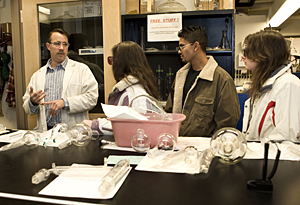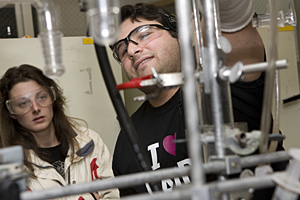

- Rozovsky wins prestigious NSF Early Career Award
- UD students meet alumni, experience 'closing bell' at NYSE
- Newark Police seek assistance in identifying suspects in robbery
- Rivlin says bipartisan budget action, stronger budget rules key to reversing debt
- Stink bugs shouldn't pose problem until late summer
- Gao to honor Placido Domingo in Washington performance
- Adopt-A-Highway project keeps Lewes road clean
- WVUD's Radiothon fundraiser runs April 1-10
- W.D. Snodgrass Symposium to honor Pulitzer winner
- New guide helps cancer patients manage symptoms
- UD in the News, March 25, 2011
- For the Record, March 25, 2011
- Public opinion expert discusses world views of U.S. in Global Agenda series
- Congressional delegation, dean laud Center for Community Research and Service program
- Center for Political Communication sets symposium on politics, entertainment
- Students work to raise funds, awareness of domestic violence
- Equestrian team wins regional championship in Western riding
- Markell, Harker stress importance of agriculture to Delaware's economy
- Carol A. Ammon MBA Case Competition winners announced
- Prof presents blood-clotting studies at Gordon Research Conference
- Sexual Assault Awareness Month events, programs announced
- Stay connected with Sea Grant, CEOE e-newsletter
- A message to UD regarding the tragedy in Japan
- More News >>
- March 31-May 14: REP stages Neil Simon's 'The Good Doctor'
- April 2: Newark plans annual 'wine and dine'
- April 5: Expert perspective on U.S. health care
- April 5: Comedian Ace Guillen to visit Scrounge
- April 6, May 4: School of Nursing sponsors research lecture series
- April 6-May 4: Confucius Institute presents Chinese Film Series on Wednesdays
- April 6: IPCC's Pachauri to discuss sustainable development in DENIN Dialogue Series
- April 7: 'WVUDstock' radiothon concert announced
- April 8: English Language Institute presents 'Arts in Translation'
- April 9: Green and Healthy Living Expo planned at The Bob
- April 9: Center for Political Communication to host Onion editor
- April 10: Alumni Easter Egg-stravaganza planned
- April 11: CDS session to focus on visual assistive technologies
- April 12: T.J. Stiles to speak at UDLA annual dinner
- April 15, 16: Annual UD push lawnmower tune-up scheduled
- April 15, 16: Master Players series presents iMusic 4, China Magpie
- April 15, 16: Delaware Symphony, UD chorus to perform Mahler work
- April 18: Former NFL Coach Bill Cowher featured in UD Speaks
- April 21-24: Sesame Street Live brings Elmo and friends to The Bob
- April 30: Save the date for Ag Day 2011 at UD
- April 30: Symposium to consider 'Frontiers at the Chemistry-Biology Interface'
- April 30-May 1: Relay for Life set at Delaware Field House
- May 4: Delaware Membrane Protein Symposium announced
- May 5: Northwestern University's Leon Keer to deliver Kerr lecture
- May 7: Women's volleyball team to host second annual Spring Fling
- Through May 3: SPPA announces speakers for 10th annual lecture series
- Through May 4: Global Agenda sees U.S. through others' eyes; World Bank president to speak
- Through May 4: 'Research on Race, Ethnicity, Culture' topic of series
- Through May 9: Black American Studies announces lecture series
- Through May 11: 'Challenges in Jewish Culture' lecture series announced
- Through May 11: Area Studies research featured in speaker series
- Through June 5: 'Andy Warhol: Behind the Camera' on view in Old College Gallery
- Through July 15: 'Bodyscapes' on view at Mechanical Hall Gallery
- More What's Happening >>
- UD calendar >>
- Middle States evaluation team on campus April 5
- Phipps named HR Liaison of the Quarter
- Senior wins iPad for participating in assessment study
- April 19: Procurement Services schedules information sessions
- UD Bookstore announces spring break hours
- HealthyU Wellness Program encourages employees to 'Step into Spring'
- April 8-29: Faculty roundtable series considers student engagement
- GRE is changing; learn more at April 15 info session
- April 30: UD Evening with Blue Rocks set for employees
- Morris Library to be open 24/7 during final exams
- More Campus FYI >>
8:49 a.m., Feb. 4, 2009----When Doug Nixon, glass technologist at the University of Delaware, recently hosted a tour for a group of students from Salem Community College (SCC) in New Jersey, he was simply paying back a long-overdue debt.
Dennis Briening, coordinator of the Glass Center at SCC, was the inspiration for Nixon's interest in glass blowing more than 30 years ago, when Nixon watched Briening making ornamental pieces in his garage.
Nixon then went on to receive his own training in scientific glass technology at SCC, the only school in the U.S. offering a certification program as well as an accredited two-year degree in this subject.
For the past 20 years, Nixon has run the Scientific Glassblowing Shop at UD, which is housed in the Department of Chemistry and Biochemistry but serves the entire campus. He has completed projects for marine studies, engineering, plant and soil sciences and biology, as well as the Delaware Biotechnology Institute and the Center for Composite Materials.
“You can get a really good idea of the level of scientific research that goes on at a university by seeing whether or not they have their own glass-blower,” Nixon says. “Only the larger programs have this capability in-house.”
According to Klaus Theopold, professor and chairperson of the Department of Chemistry and Biochemistry at UD, it's an important capability. “For centuries, advances in chemistry have depended on the unique properties of glass,” he says. “Being resistant to attack by nearly all chemical substances and also transparent -- thus allowing direct visual observation of changes as a reaction proceeds -- makes glass the perfect container for studying chemical reactions.”
“Of course,” Theopold continues, “there is one major drawback, and that is the tendency for glass to break easily. Enter our 'glassblower,' an artisan who fashions complicated pieces of scientific apparatus from glass. Whether we need a new vacuum manifold made or a broken reaction flask fixed, our in-house glassblower can do it all. With 150 graduate students and many undergraduates doing research, Doug Nixon is one of our busiest staff members. The business of chemistry and biochemistry would simply be impossible without him.”
Nixon's primary job is to fabricate, modify and repair scientific apparatus and instruments. The fabrication part of his job is all custom work, with the pieces tailored to the requirements of specific research protocols. He works from graphic and verbal input provided by the faculty and grad students conducting the research. The sketches he starts with range from simple pencil drawings to more elaborate computer-generated concepts.
“Sometimes I have to sit and stare at a basic sketch for a while just to get an idea of where to start,” Nixon says. “Then I work from the inside out and draw up something that I think will work.”
Apparently, Nixon is quite good at creating pieces that work. “I couldn't possibly perform any of my research if it wasn't for Doug's help,” says Wes Monillas, a doctoral candidate in chemistry. “I use a lot of very specialized glassware that would be prohibitively expensive or downright impossible to purchase. With Doug's help I can get the pieces I need, quickly and easily.”
The tools of Nixon's trade range from such simple household supplies as tape, string, wire and adhesives to band saws, sanders, lathes, torches and ovens. His custom-designed shop in the basement of Brown Laboratory, which was renovated just two years ago, also includes a microscope to help him locate flaws in glass and a polariscope, which shows invisible strain patterns under polarized light.
Nixon not only works in glass but also serves as a general resource on the topic. He runs an informative Web site that answers commonly asked questions and directs users to valuable outside resources, such as the American Scientific Glassblowers Society (ASGS). He also maintains a technical and material library to assist faculty, staff, and students with locating needed information, products, and parts. In addition, he serves as an important safety resource with regard to the safe handling, cleaning, use, and disposal of glass.
For Nixon, the best part of his job is “not knowing what's going to come through the door on any given day.” And sometimes, what comes through the door isn't even scientific in nature. In the past, he was called on to repair an antique barometer owned by then-president David Roselle. More recently, he fabricated some custom glass vessels for use as props in the UD production of the Moliere satire “The Imaginary Invalid.”
“I try to solve most problems that come through the door,” Nixon says. “If I don't know the answers myself, I at least try to figure out where to get them.”
He is also philosophical about his trade. “There are different ways to approach just about every job,” he says. “I just try to figure out the most efficient way to get it done.”
Article by Diane Kukich
Photos by Ambre Alexander


